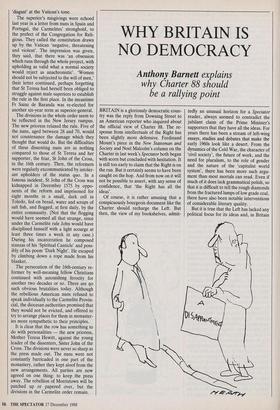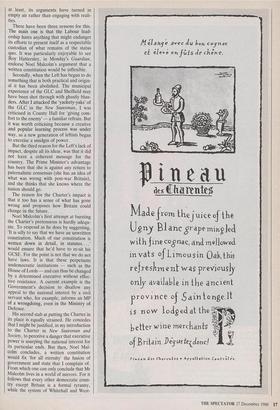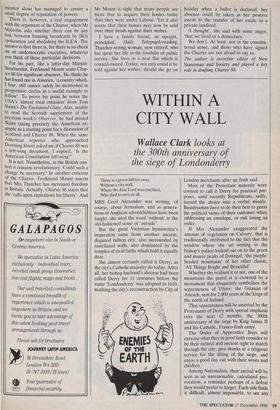WHY BRITAIN IS NO DEMOCRACY
Anthony Barnett explains
why Charter 88 should be a rallying point
BRITAIN is a gloriously democratic coun- try was the reply from Downing Street to an American reporter who inquired about the official view of Charter 88. The re- sponse from intellectuals of the Right has been slightly more defensive. Ferdinand Mount's piece in the New Statesman and Society and Noel Malcolm's column on the Charter in last week's Spectator both began with scorn but concluded with hesitation. It is still too early to claim that the Right is on the run. But it certainly seems to have been caught on the hop. And from now on it will not be possible to assert, with any sense of confidence, that 'the Right has all the ideas'.
Of course, it is rather amusing that a conspicuously bourgeois document like the Charter should recharge the Left. But then, the view of my bookshelves, admit- tedly an unusual horizon for a Spectator reader, always seemed to contradict the jubilant claim of the Prime Minister's supporters that they have all the ideas. For years there has been a stream of left-wing essays, studies and debates that make the early 1960s look like a desert. From the dynamics of the Cold War, the character of 'civil society', the future of work, and the need for pluralism, to the role of gender and the nature of the 'capitalist world system', there has been more such argu- ment than most mortals can read. Even if much of it does lack grammatical polish, so that it is difficult to tell the rough diamonds from the fractured lumps of low grade coal, there have also been notable interventions of considerable literary quality.
But it is true that the Left has lacked any political focus for its ideas and, in Britain at least, its arguments have turned in empty air rather than engaging with reali- ties.
There have been three reasons for this. The main one is that the Labour lead- ership hates anything that might endanger its efforts to present itself as a respectable custodian of what remains of the status quo. It was particularly enjoyable to see Roy Hattersley, in Monday's Guardian, endorse Noel Malcolm's argument that a written constitution would be inflexible.
Secondly, when the Left has begun to do something that is both practical and origin- al it has been abolished. The municipal experience of the GLC and Sheffield may have been shot through with ghastly blun- ders. After I attacked the `yackety-yaks' of the GLC in the New Statesman, I was criticised in County Hall for 'giving com- fort to the enemy' — a familiar refrain. But it was worth criticising because a creative and popular learning process was under way, as a new generation of leftists began to exercise a smidgin of power.
But the third reason for the Left's lack of impact, despite all its ideas, was that it did not have a coherent message for the country. The Prime Minister's advantage has been that she is against any return to paternalistic consensus (she has an idea of what was wrong with post-war Britain), and she thinks that she knows where the nation should go.
The reason for the Charter's impact is that it too has a sense of what has gone wrong and proposes how Britain could change in the future.
Noel Malcolm's first attempt at bursting the Charter's pretensions is hardly adequ- ate. To respond as he does by suggesting, 'It is silly to say that we have an unwritten constitution. Much of our constitution is written down in detail, in statutes....'
would ensure that he'd have to re-sit his GCSE. For the point is not that we do not have laws. It is that these perpetuate undemocratic institutions — such as the House of Lords — and can thus be changed by a determined executive without effec- tive resistance. A current example is the Government's decision to disallow any appeal to the national interest by a civil servant who, for example, informs an MP of a wrongdoing, even in the Ministry of Defence.
His second stab at putting the Charter in its place is equally strained. He concedes that I might be justified, in my introduction to the Charter in New Statesman and Society, to perceive a danger that executive power is usurping the national interest for its particular ends. But then, Noel Mal- colm concludes, a written constitution would fix 'for all eternity' the fusion of government and state that I complain of. From which one can only conclude that Mr Malcolm lives in a world of mirrors. For it follows that every other democratic coun- try except Britain is a formal tyranny, while the system of Whitehall and West- rninster alone has managed to ensure a small degree of separation of powers.
_There is, however, a real engagement with the argument of the Charter, when Mr Malcolm asks whether there can be any link between banning broadcasts by IRA Spokesmen and abolishing the ILEA. The answer is that there is, for there is no check on an undemocratic executive, whatever You think of these particular decisions.
For his part, like a latter-day Marxist- Structuralist, Ferdinand Mount scans Char- ter 88 for significant absences. He thinks he has found one in America, 'a country which, I fear, still cannot safely be mentioned in progressive circles as a useful example to follow'. To prove his point he notes the USA's 'almost total omission' from Tom Nairn's The Enchanted Glass. Alas, unable to read the Scottish supplement of the Previous week's Observer, he had missed Nairn taking precisely the American ex- ample as a starting point for a discussion of Scotland and Charter 88. When the same American reporter who approached Downing Street asked me if Charter 88 was a left-wing document, I replied, 'Is the American Constitution left-wing?'
It is not. Nonetheless, in the British con- text it remains revolutionary. Could such a change be necessary? In another criticism of the Charter, Ferdinand Mount asserts that Mrs Thatcher has increased freedom in Britain. Actually, Charter 88 states that she 'calls upon aspirations for liberty'. And Mr Mount is right that many people are more free to acquire their homes today than they were under Labour. Yet it also seems that their homes may now be sold over their heads against their wishes.
I have a family friend, an upright, principled, Daily Telegraph-reading, Thatcher-voting woman, now retired, who has spent her life in the foothills of public service. She lives in a neat flat which is council-owned. Today, not only could it be sold against her wishes; should she go on
holiday when a ballot is declared, her absence could be taken as her positive assent to the transfer of her estate to a private landlord.
'I thought', she said with some anger, 'that we lived in a democracy.'
We don't. At least, not in the constitu- tional sense, and those who have signed the Charter are not afraid to say so.
The author is associate editor of New Statesman and Society and played a key role in drafting Charter 88.




























































 Previous page
Previous page